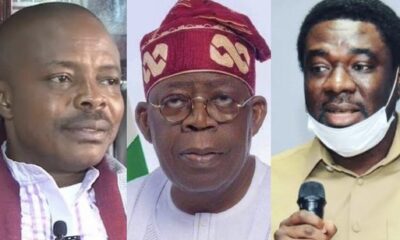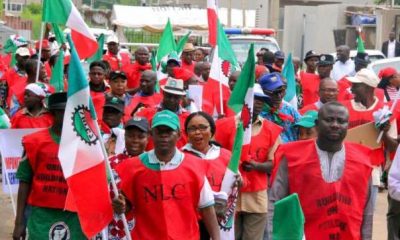News
New minimum wage implementation begins April – NLC

New minimum wage implementation begins April – NLC
The Nigeria Labour Congress (NLC), on Thursday, said the new minimum wage for Nigerian workers would begin in April this year.
it also disclosed that the Tripartite Committee on the National Minimum Wage would meet on March 27 and 28, 2024 to submit and deliberate on its zonal reports.
It was gathered that the current N30,000 minimum wage expires this month, while the new one would take off from next month.
This came as state governors warned against unrealistic demands from Labour and urged the National Minimum Wage Committee to consider the capacities of states to pay the new minimum wage during the meeting on March 27 and 28, 2024.
But labour insisted that the governors were unwilling to pay workers despite receiving bailouts, for instance, during the administration of former President Muhammadu Buhari,
They stressed that the payment of salaries was not charity, as workers work hard to earn their salaries.
Speaking on the March 27 and 28 meeting, the National President of the NLC, Joe Ajaero, said, “The zonal committees are submitting the reports of the public hearings on March 27, 2024.
“You know that after the public hearings, all that we have are the several zonal reports, so we will now bring them together to work on them before reaching agreements.”
He explained that the zonal committees would submit their reports to the Minimum Wage Committee “when we reconvene on March 27 and 28 with the reports from our various zones.
“From there we can now look at the various reports, deliberate on them, and do further consultations.”
Asked whether the implementation of the new minimum wage would start on April 20 as speculated in some quarters, Ajaero replied, “They don’t pay salaries on the 20th. The effective date for implementation is April. So if we finish (deliberations), they pay, but if we don’t finish, then they will pay arrears for that month.”
The Federal Government in January this year announced its plan to implement a new minimum wage to reflect the current economic realities.
READ ALSO:
- Fresh diphtheria outbreak kills four in Kano
- Thousands may miss Ramadan Umrah as S/Arabia fails to issue visas
- One dead as cult boys attack NDLEA officers in Bayelsa
The current national minimum wage is N30,000, which the labour unions have argued that it is no longer realistic, given the galloping inflation in Nigeria.
President Bola Tinubu, in his New Year broadcast, said his administration was committed to implementing a new minimum wage to give Nigerian workers an improved welfare.
The government subsequently set up a tripartite committee on January 30, 2024, to determine a new minimum wage.
The 37-man committee is chaired by the former Head of the Civil Service of the Federation, Goni Aji.
The committee had the terms of reference to ‘consult all stakeholders on the issue of national minimum wage and recommend a realistic and practical national minimum wage to the government.’
In furtherance of the assignment, a zonal public hearing was held simultaneously on March 7, 2024 in Lagos, Kano, Enugu, Akwa Ibom, Adamawa, and Abuja.
The NLC and the TUC in different states proposed various figures as a living wage, referencing the current economic crunch and the high costs of living.
In their different proposals on the minimum wage, the NLC asked the South-West states to pay N794,000 as the TUC mentioned N447,000.
At the North-Central zone hearing in Abuja, the workers demanded N709,000 as the new national minimum wage, while at the South-South, N850,000 minimum wage was demanded.
In the North-West, N485,000 was proposed, while the South-East stakeholders demanded N540,000 minimum wage.
When approached on Thursday to provide updates on the tripartite committee’s activities, another official with the NLC, who spoke on condition of anonymity due to lack of authority to speak on the matter, confirmed the position of the NLC president.
The source said, “There will be a meeting of the National Minimum Wage Committee on the 27th and 28th of this month inside the Villa and we expect that those reports will be submitted and acted upon. Other discussions will be furthered during the meetings and we hope that issues around the figures will receive greater attention.
“The implementation of the new minimum wage can only commence after it has been passed into law and we expect that the entire process which includes passage into law by the National Assembly would have been completed, at least by April 19, which is the day the existing new minimum wage would have expired. So that the new minimum wage will take off by the next day, being 20th of April, 2024.”
New minimum wage Implementation begin April – NLC
(PUNCH)
News
Why governors’ forum is silent on Rivers emergency, by DG
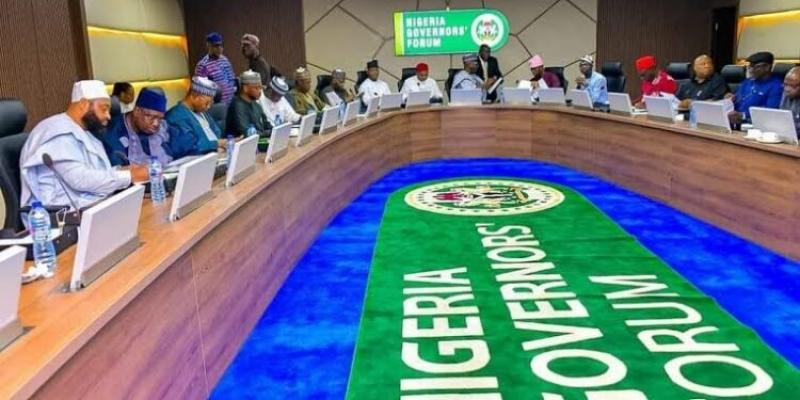
Why governors’ forum is silent on Rivers emergency, by DG
The Nigeria Governors’ Forum (NGF) yesterday attributed its neutral position on the recent declaration of a state of emergency in Rivers State to the need to steer clear of taking positions that may alienate members with varying political interests.
Taking positions on contentious partisan issues, the NGF said, would not augur well for it, especially in view of its past experience in fundamental division.
Notwithstanding, the declaration of the state of emergency by President Bola Tinubu yesterday generated more kudos and knocks from across the country.
Special Adviser to the President on Senate Matters, Senator Basheer Lado, said the action of the president was meant to ensure protection of lives and restoration of law and order in the state, while the President’s Special Adviser on Media and Public Communications, Sunday Dare, said his principal was required to “avert needless harm and destruction .”
National Publicity Secretary of the ruling All Progressives Congress (APC), Felix Morka, said Tinubu, by his action, cleared what had manifested as a constitutional crisis in Rivers state.
But former President Goodluck Jonathan saw it from a different perspective.
READ ALSO:
- Senate didn’t get 2\3 majority for Tinubu emergency rule in Rivers –Tambuwal
- FG destroys another 200 containers of expired drugs
- Rivers court bars woman from answering ex-husband’s name
He described “abuse of office and power by the three arms of government in the country“ as a dent on Nigeria’s image.
The NGF, in a statement by its Director General Abdulateef Shittu, said it is essentially “an umbrella body for sub-national governments to promote unified policy positions and collaborate with relevant stakeholders in pursuit of sustainable socio-economic growth and the well-being of the people.”
It added: “As a technical and policy hub comprising governors elected on different platforms, the body elects to steer clear of taking positions that may alienate members with varying political interests.
“In whatever language it is written, taking positions on contentious partisan issues would mean a poor sense of history — just a few years after the forum survived a fundamental division following political differences among its members.
“Regardless, the Forum is reputed for its bold positions on governance and general policy matters of profound consequences, such as wages, taxes, education and universal healthcare, among others.”
It asked for “the understanding of the public and the media, confident that appropriate platforms and crisis management mechanisms would take care of any such issues.”
Why governors’ forum is silent on Rivers emergency, by DG
News
Rivers: Tinubu acted to save state, economy, says Karimi
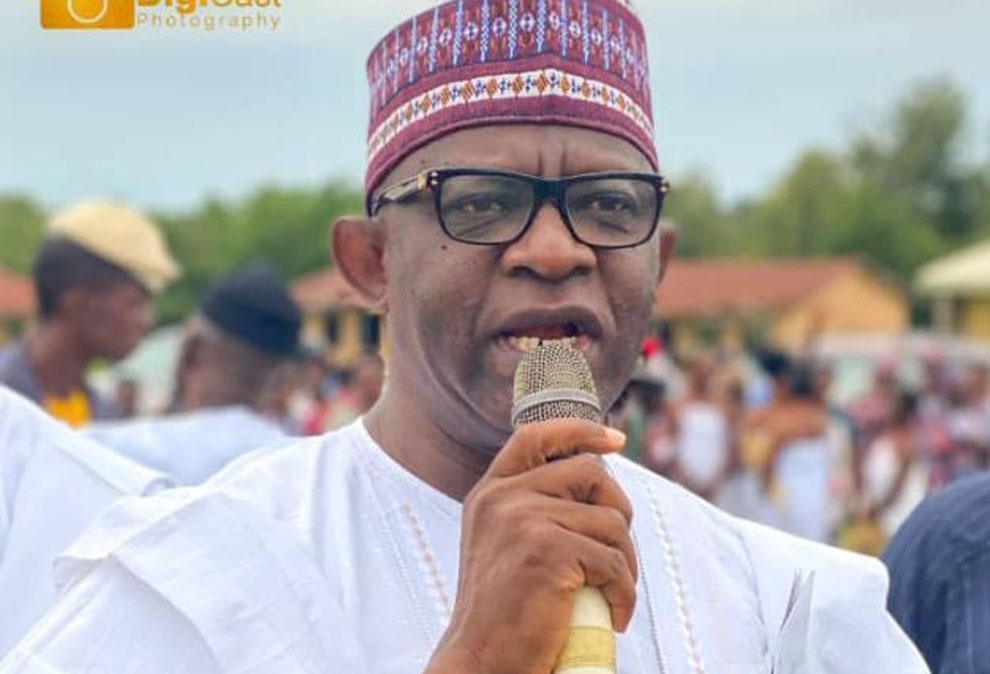
Rivers: Tinubu acted to save state, economy, says Karimi
Chairman of the Senate Services Sunday Karimi has hailed President Bola Tinubu for the decision to declare a state of emergency in Rivers State.
He told reporters on Friday in Abuja that the President acted in the best interest of the State and Nigeria, having taken his decision in compliance with the Constitution.
“No President or government worth a name, will fold its arms and watch a political situation deteriorate to what we saw unfolding in Rivers State.
“We saw that bombing of pipelines had begun, and the security situation was getting worse with the tension everywhere”, Karimi stated.
Karimi, who represents Kogi-West on the ticket of the All Progressives Congress (APC), recalled the “fatherly role” Tinubu had played in the crisis since 2023 in a bid to get the Minister of the Federal Capital Territory (FCT), Nyesom Wike, and suspended Governor Siminalayi Fubara to reach an understanding, to no avail.
He explained: “We were all here in 2023 when Mr President called that truce meeting at the Aso Rock Villa. There was the eight-point agenda for settlement reached between the factions.
“When Nigerians expected that progress should be made to achieve peace, things started deteriorating considerably to a point where the governor demolished the House of Assembly building and administered the state with only three legislators.”
READ ALSO:
- Oluwo accuses Ooni of plotting to dethrone him
- Natasha: Court blocks recall attempt, stops INEC
- US ends legal status for 500,000 immigrants
Karimi observed that with the recent judgment of the Supreme Court, which gave the upper hand to the 27 lawmakers loyal to the camp of the FCT Minister, matters merely got worse in the State as the lawmakers were set to impeach the Governor.
“What did you expect would be the implications? There would have been more destruction, killings and economic losses for the country.
“With the bombings that had already started, it was a matter of time before the whole state would be engulfed in flames. No responsible President would sit, arms folded, and allow that to happen “ he added.
The senator further argued that it took “painstaking efforts” by the administration to raise daily crude oil production to around 1,800 barrels, noting that Nigeria’s economy was already “witnessing a rebound under the renewed hope projects of the government.”
“Allowing the situation in Rivers to get worse before he would act, wouldn’t have helped the state or Nigeria as a country in any way.
“Mr. President intervened at the right time, and his actions are covered by law,” he said.
Karimi also spoke on the emergency declaration in Borno, Yobe, Adamawa and a couple of other states by former President Goodluck Jonathan without removing the Governors from office or suspending the state assemblies.
According to him, the case with those States was not generated by political crises but rather security concerns.
“So, I will advise those comparing the two scenarios to remember that one was purely about security threats resulting from the insurgency caused by Boko Haram, while that of Rivers is clearly political.
“It was the proper thing to do to suspend the political actors in the two factions to allow for tensions to diffuse. Nigerians should appreciate the President for the action he has taken so far,” he stated.
Sen. Karimi also noted that there was no cause for alarm as the National Assembly had indicated that the emergency rule could be reviewed as soon as there were signs that things could quickly normalise in Rivers State.
Rivers: Tinubu acted to save state, economy, says Karimi
News
Just in: Tinubu swears in Rivers Sole Administrator Ibas
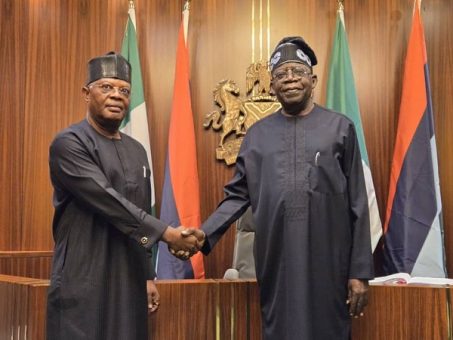
Just in: Tinubu swears in Rivers Sole Administrator Ibok-ete Ibas
President Bola Tinubu has sworn in Vice Vice Admiral Ibok-ete Ibas (Retd.) as the Sole Administrator of Rivers State.
The administrator was sworn in on Wednesday after a short meeting with the President.
Tinubu announced the appointment of the retired naval chief at a nationwide broadcast on Tuesday, when he declared a state of emergency in Rivers State and suspended Governor Siminalayi Fubara, Deputy Governor, Ngozi Odu, and the state House of Assembly members.
The President said his decision was based on Section 305 of the 1999 Constitution, saying he could not continue to watch the political situation in Rivers escalate without taking concrete action.
The suspension of Fubara and other elected representatives has been rejected and condemned by many eminent Nigerians, legal luminaries, groups such as Atiku Abubakar, Peter Obi, Femi Falana, the Labour Party (LP), the Peoples Democratic Party (PDP) and the Nigerian Bar Association.
However, the emergency rule has been praised by the pro-Nyesom Wike Assembly led by Martins Amaewhule, accusing Fubara of contravening the Supreme Court ruling on the political situation in the state.
Ibas was the Chief of Naval Staff from 2015 to 2021.
He is from Cross River State where he had his early education.
The new sole administrator went to the Nigerian Defence Academy in 1979 from where he proceeded to have a successful career in the Navy, rising through the ranks to the very top.
He is a member of the Nigerian Institute of International Affairs (NIIA) and the Nigerian Institute of Management.
President Muhammadu Buhari who appointed him as Chief of Naval Staff conferred him with the National Honour of Commander of the Federal Republic (CFR) in 2022.
-

 metro3 days ago
metro3 days ago‘We’re not hiring,’ NNPC denies viral recruitment adverts
-

 metro2 days ago
metro2 days agoNatasha: Court blocks recall attempt, stops INEC
-
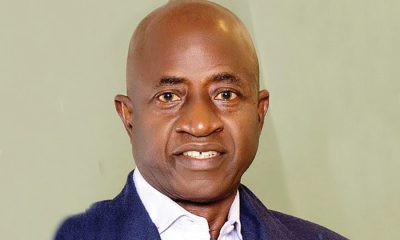
 Sports2 days ago
Sports2 days agoOdegbami speaks on Osimhen breaking his 44-year goals record
-

 Entertainment2 days ago
Entertainment2 days agoI didn’t snatch Asake’s mother from her husband -Musibau Alani
-

 Sports3 days ago
Sports3 days ago2026 WCQ: Super Eagles move up to third place with 2-0 win in Rwanda
-

 Sports3 days ago
Sports3 days agoOsimhen breaks Odegbami’s Eagles goal record
-

 Entertainment17 hours ago
Entertainment17 hours agoSome ladies in movie industry ready to sleep their way to fame — Jide Kosoko
-

 metro2 days ago
metro2 days agoOluwo accuses Ooni of plotting to dethrone him

